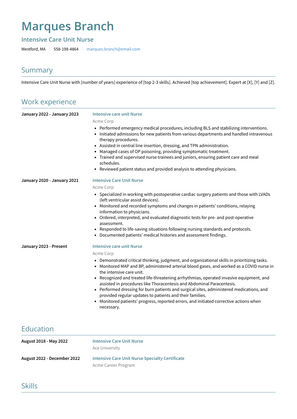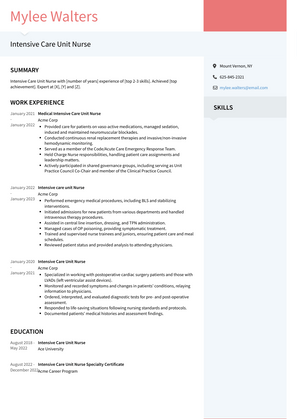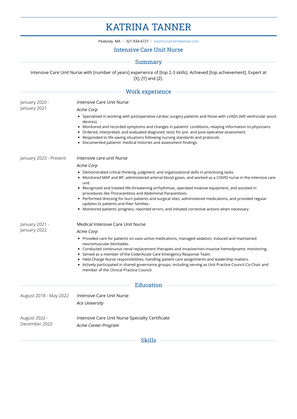Intensive Care Unit Nurse Resume Examples and Templates
This page provides you with Intensive Care Unit Nurse resume samples to use to create your own resume with our easy-to-use resume builder. Below you'll find our how-to section that will guide you through each section of a Intensive Care Unit Nurse resume.



What Do Hiring Managers Look for in an Intensive Care Unit Nurse Resume?
‣ Critical Care Skills: Possessing advanced skills in critical care nursing, including the ability to monitor and manage patients with complex and life-threatening conditions.
‣ Patient Advocacy: Advocating for the needs and well-being of critically ill patients, ensuring that they receive appropriate care, support, and attention.
‣ Team Collaboration: Collaborating effectively with a multidisciplinary healthcare team, including physicians, respiratory therapists, and other healthcare professionals, to provide comprehensive patient care.
‣ Emergency Response: Being well-prepared to respond to medical emergencies, administering life-saving interventions, and maintaining composure in high-pressure situations.
‣ Communication: Communicating clearly and compassionately with patients and their families, providing updates on patient conditions, explaining treatment plans, and offering emotional support.
How to Write a Intensive Care Unit Nurse Resume?
To write a professional Intensive Care Unit Nurse resume, follow these steps:
- Select the right Intensive Care Unit Nurse resume template.
- Write a professional summary at the top explaining your Intensive Care Unit Nurse’s experience and achievements.
- Follow the STAR method while writing your Intensive Care Unit Nurse resume’s work experience. Show what you were responsible for and what you achieved as {a/an} Intensive Care Unit Nurse.
- List your top Intensive Care Unit Nurse skills in a separate skills section.
Before we proceed any further, checkout our medical resume templates that are loved by thousands of medical professionals.
How to Format a Intensive Care Unit Nurse Resume?
To format your Intensive Care Unit Nurse Resume:
- You can create a resume from scratch, use a resume builder, or use a Google doc resume templates or Word resume template.
- Make sure to select the right resume layout. You can pick from reverse chronological format, combination resume format or a functional resume format.
- Include some or all of these sections within your resume: resume header, summary or objective, resume experience, skills, certifications, education, portfolio, interests, achievements, references, or your publications.
- Make sure that you have an ATS friendly resume template. Your resume can look good, but you are likely to be filtered through an ATS system.
- You can take feedback from friends/family/colleagues, use an AI resume builder, or even use a professional resume formatting or review service if you are unsure.
- If you are still unsatisfied with your resume’s formatting, consider a professional resume writing service.
How to Write Your Intensive Care Unit Nurse Resume Header?
Write the perfect Intensive Care Unit Nurse resume header by:
- Adding your full name at the top of the header.
- Add a photo to your resume if you are applying for jobs outside of the US. For applying to jobs within the US, avoid adding photo to your resume header.
- Add your current Intensive Care Unit Nurse to the header to show relevance.
- Add your current city, your phone number and a professional email address.
- Finally, add a link to your portfolio to the Intensive Care Unit Nurse resume header. If there’s no portfolio link to add, consider adding a link to your LinkedIn profile instead.
Bad Intensive Care Unit Nurse Resume Example - Header Section
Caroline 696 Rock Maple St. South Lyon, MI 48178 Marital Status: Married, email: cooldude2022@gmail.com
Good Intensive Care Unit Nurse Resume Example - Header Section
Caroline Mendez, Lyon, MI, Phone number: +1-555-555-5555, Link: linkedin/in/johndoe
Make sure to add a professional looking email address while writing your resume header. Let’s assume your name is John Doe - here is a formula you can use to create email addresses:
- firstnamelastname@email.com - johndoe@email.com
- firstname.lastname@email.com - john.doe@email.com
- lastname.firstname@email.com - doe.john@email.com
- f.lastname@email.com - j.doe@email.com
- l.firstname@email.com - d.john@email.com
- firstnamelastname12@email.com - johndoe12@email.com
For a Intensive Care Unit Nurse email, we recommend you either go with a custom domain name (john@johndoe.com) or select a very reputed email provider (Gmail or Outlook).
How to Write a Professional Intensive Care Unit Nurse Resume Summary?
Use this template to write the best Intensive Care Unit Nurse resume summary: Intensive Care Unit Nurse with [number of years] experience of [top 2-3 skills]. Achieved [top achievement]. Expert at [X], [Y] and [Z].
How to Write a Intensive Care Unit Nurse Resume Experience Section?
Here’s how you can write a job winning Intensive Care Unit Nurse resume experience section:
- Write your Intensive Care Unit Nurse work experience in a reverse chronological order.
- Use bullets instead of paragraphs to explain your Intensive Care Unit Nurse work experience.
- While describing your work experience focus on highlighting what you did and the impact you made (you can use numbers to describe your success as a Intensive Care Unit Nurse).
- Use action verbs in your bullet points.
Intensive care unit Nurse Resume Example
Intensive care unit Nurse
- Demonstrated critical thinking, judgment, and organizational skills in prioritizing tasks.
- Monitored MAP and BP, administered arterial blood gases, and worked as a COVID nurse in the intensive care unit.
- Recognized and treated life-threatening arrhythmias, operated invasive equipment, and assisted in procedures like Thoracentesis and Abdominal Paracentesis.
- Performed dressing for burn patients and surgical sites, administered medications, and provided regular updates to patients and their families.
- Monitored patients' progress, reported errors, and initiated corrective actions when necessary.
Intensive care unit Nurse Resume Example
Intensive care unit Nurse
- Performed emergency medical procedures, including BLS and stabilizing interventions.
- Initiated admissions for new patients from various departments and handled intravenous therapy procedures.
- Assisted in central line insertion, dressing, and TPN administration.
- Managed cases of OP poisoning, providing symptomatic treatment.
- Trained and supervised nurse trainees and juniors, ensuring patient care and meal schedules.
- Reviewed patient status and provided analysis to attending physicians.
Medical Intensive Care Unit Nurse Resume Example
Medical Intensive Care Unit Nurse
- Provided care for patients on vaso-active medications, managed sedation, induced and maintained neuromuscular blockades.
- Conducted continuous renal replacement therapies and invasive/non-invasive hemodynamic monitoring.
- Served as a member of the Code/Acute Care Emergency Response Team.
- Held Charge Nurse responsibilities, handling patient care assignments and leadership matters.
- Actively participated in shared governance groups, including serving as Unit Practice Council Co-Chair and member of the Clinical Practice Council.
Intensive Care Unit Nurse Resume Example
Intensive Care Unit Nurse
- Specialized in working with postoperative cardiac surgery patients and those with LVADs (left ventricular assist devices).
- Monitored and recorded symptoms and changes in patients' conditions, relaying information to physicians.
- Ordered, interpreted, and evaluated diagnostic tests for pre- and post-operative assessment.
- Responded to life-saving situations following nursing standards and protocols.
- Documented patients' medical histories and assessment findings.
Top Intensive Care Unit Nurse Resume Skills for 2023
- Advanced Cardiac Life Support (ACLS)
- Basic Life Support (BLS)
- Critical Care Nursing
- Advanced Assessment Skills
- Ventilator Management
- Monitoring Hemodynamic Parameters
- Intravenous (IV) Therapy
- Medication Administration
- Electrocardiogram (ECG) Interpretation
- Arterial Line Monitoring
- Central Venous Catheter (CVC) Care
- Pulmonary Artery Catheter (PAC) Monitoring
- Intra-Aortic Balloon Pump (IABP) Management
- Renal Replacement Therapy (RRT)
- Continuous Renal Replacement Therapy (CRRT)
- Neurological Monitoring
- Wound Care and Dressing Changes
- Tracheostomy Care
- Postoperative Care
- Assessment of Glasgow Coma Scale (GCS)
- Monitoring of Intracranial Pressure (ICP)
- Advanced Wound and Pressure Ulcer Care
- Management of Sepsis and Septic Shock
- Transfusion Therapy
- Pain Management
- Collaboration with Multidisciplinary Teams
- Patient and Family Education
- Ethical Decision-Making in Critical Care
- End-of-Life Care
- Understanding of Mechanical Circulatory Support Devices
- Knowledge of Extracorporeal Membrane Oxygenation (ECMO)
- Infection Prevention and Control
- Emergency Response and Code Management
- Use of Electronic Health Records (EHR)
- Computerized Charting Systems
- Palliative Care Principles
- Critical Thinking in High-Stress Situations
- Emergency Cardiovascular Care (ECC)
- Understanding of Trauma Nursing
- Advanced Pharmacology Knowledge
- Management of Multiple IV Infusions
- Communication with Physicians and Healthcare Providers
- Understanding of Organ Transplantation
- Effective Communication with Patients and Families
- Knowledge of Evidence-Based Practices in Critical Care
- Continuous Education in Critical Care Nursing
- Professional Development in ICU Specializations
How Long Should my Intensive Care Unit Nurse Resume be?
Your Intensive Care Unit Nurse resume length should be less than one or two pages maximum. Unless you have more than 25 years of experience, any resume that’s more than two pages would appear to be too long and risk getting rejected.
On an average, for Intensive Care Unit Nurse, we see most resumes have a length of 2. And, that’s why we advise you to keep the resume length appropriate to not get rejected.
How can I highlight my experience as an Intensive Care Unit (ICU) Nurse on my resume?
Focus on your expertise in providing critical care to patients with life-threatening conditions. Highlight your role in monitoring vital signs, administering medication, and collaborating with the healthcare team to ensure patient stability.
What are the key skills to feature on an ICU Nurse's resume?
Emphasize skills in critical care, patient monitoring, ventilator management, and medication administration. Highlight your proficiency in handling emergency situations, advanced cardiac life support (ACLS), and operating specialized medical equipment.
How do I demonstrate my ability to care for critically ill patients on my resume?
Provide examples of how you’ve managed complex patient cases, including ventilator support, IV medication administration, and monitoring of vital signs. Highlight your role in ensuring patient stability and quick decision-making in high-pressure situations.
Should I include metrics on my ICU Nurse resume? If so, what kind?
Yes, include metrics such as the number of patients managed daily, success rates in patient recovery, or reductions in patient complications. These metrics help quantify your impact in providing critical care.
How can I showcase my experience with emergency response in the ICU on my resume?
Detail your experience in handling medical emergencies, such as cardiac arrest, respiratory failure, or sepsis. Highlight your ability to respond quickly, administer life-saving treatments, and stabilize patients during critical situations.
What kind of achievements should I highlight as an ICU Nurse?
Highlight achievements such as improving patient outcomes, reducing patient mortality, or being recognized for exceptional care in critical situations. Mention any awards or commendations received for your role in providing high-quality ICU care.
How do I address a lack of experience in a specific ICU specialty on my resume?
Emphasize your general critical care skills, adaptability, and quick learning abilities. Highlight relevant training, certifications, or personal experience that demonstrate your readiness to work in various ICU settings.
How important is teamwork for an ICU Nurse role?
Teamwork is essential for providing comprehensive care in the ICU. Highlight your experience in collaborating with physicians, respiratory therapists, and other healthcare professionals to develop and execute care plans for critically ill patients.
How do I demonstrate my ability to use ICU medical equipment on my resume?
Mention specific examples where you operated ventilators, infusion pumps, and other ICU medical equipment. Highlight your ability to troubleshoot equipment issues and ensure proper operation to maintain patient care.
Should I include certifications on my ICU Nurse resume?
Yes, include relevant certifications such as Advanced Cardiovascular Life Support (ACLS), Critical Care Registered Nurse (CCRN), or Basic Life Support (BLS). These certifications demonstrate your expertise in ICU nursing and your commitment to maintaining high standards in critical care.
-
What Do Hiring Managers Look for in an Intensive Care Unit Nurse Resume?
-
How to Write a Professional Intensive Care Unit Nurse Resume Summary?
-
How to Write a Intensive Care Unit Nurse Resume Experience Section?
-
How can I highlight my experience as an Intensive Care Unit (ICU) Nurse on my resume?
-
What are the key skills to feature on an ICU Nurse's resume?
-
How do I demonstrate my ability to care for critically ill patients on my resume?
-
Should I include metrics on my ICU Nurse resume? If so, what kind?
-
How can I showcase my experience with emergency response in the ICU on my resume?
-
What kind of achievements should I highlight as an ICU Nurse?
-
How do I address a lack of experience in a specific ICU specialty on my resume?
-
How do I demonstrate my ability to use ICU medical equipment on my resume?
Copyright ©2024 Workstory Inc.
